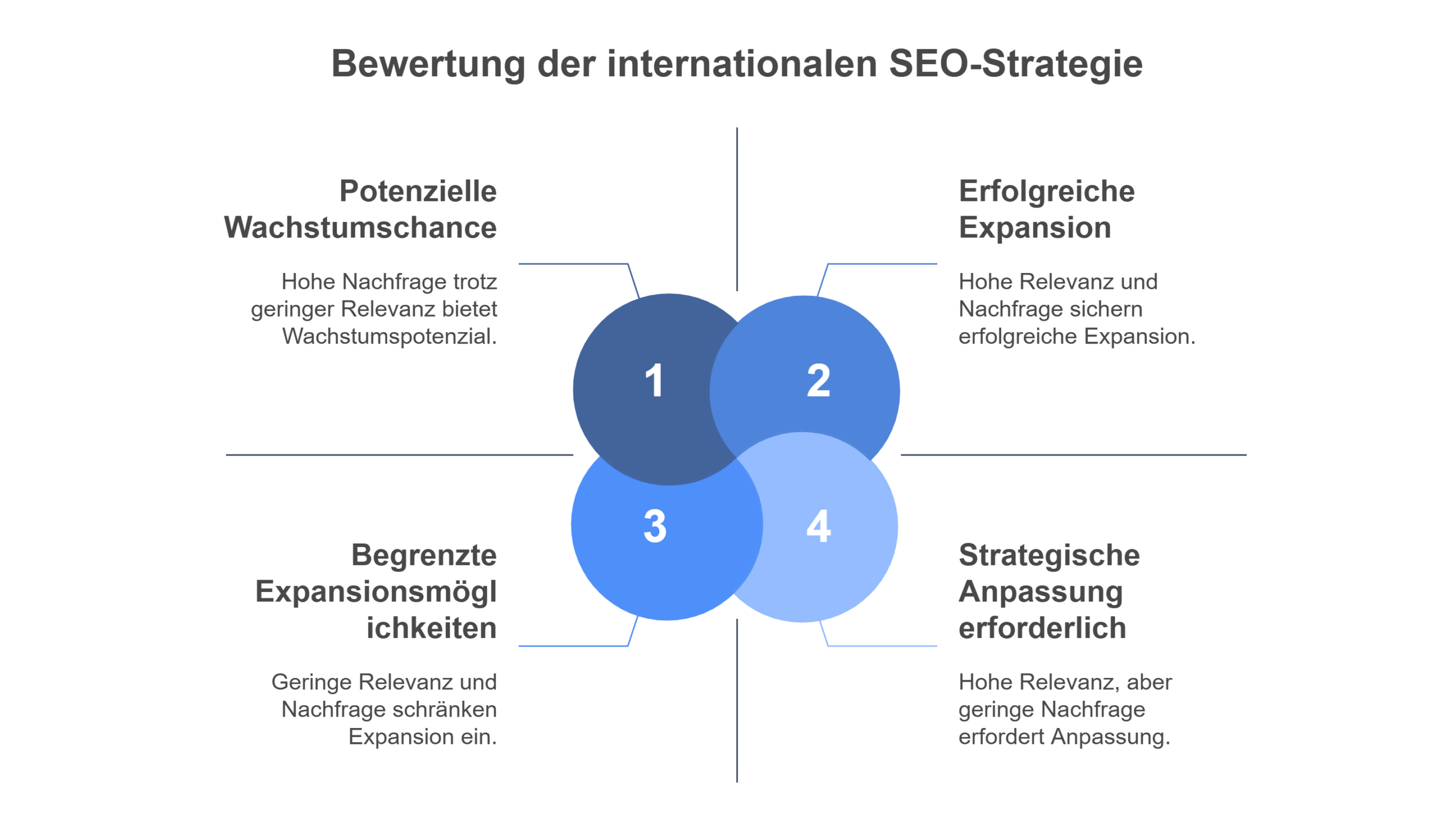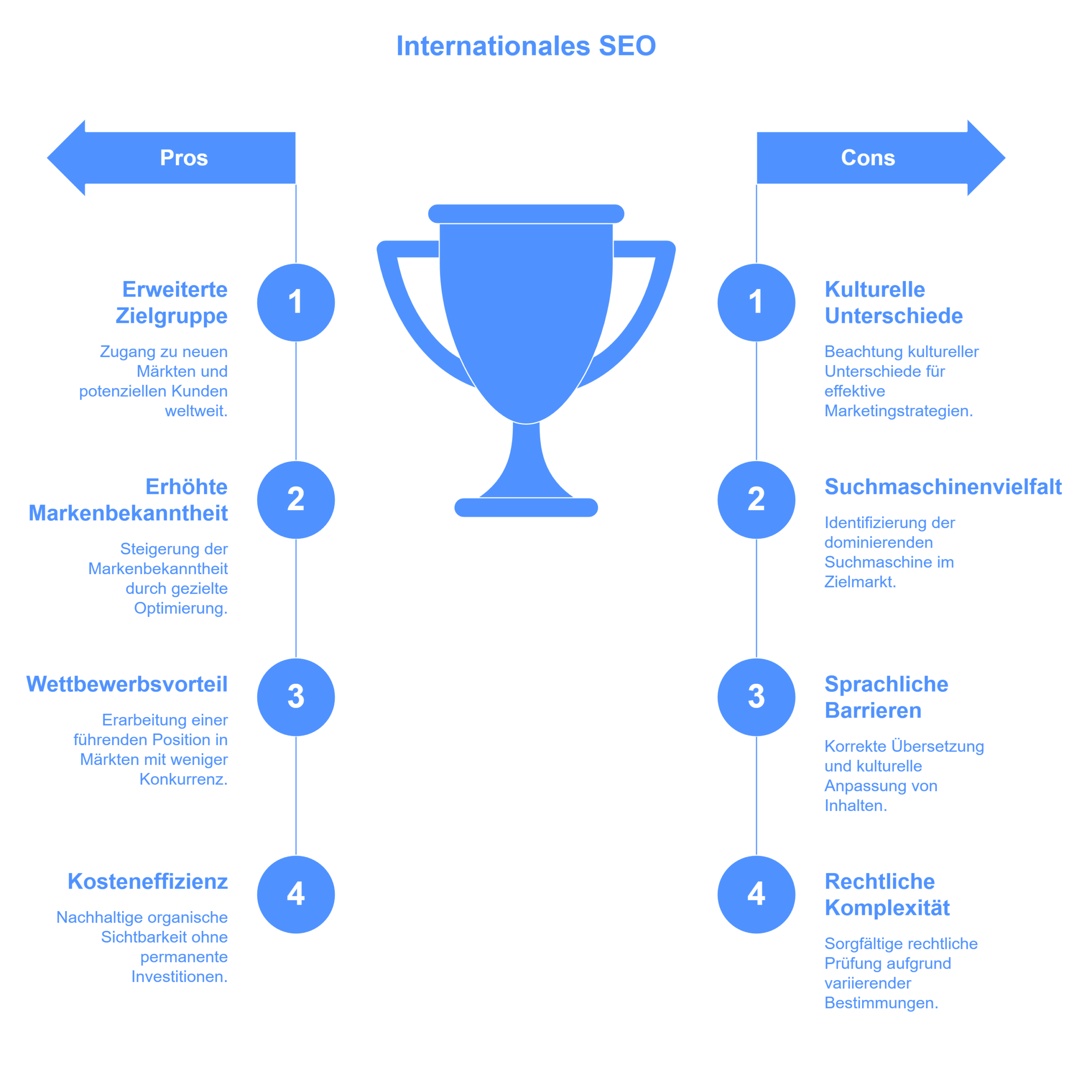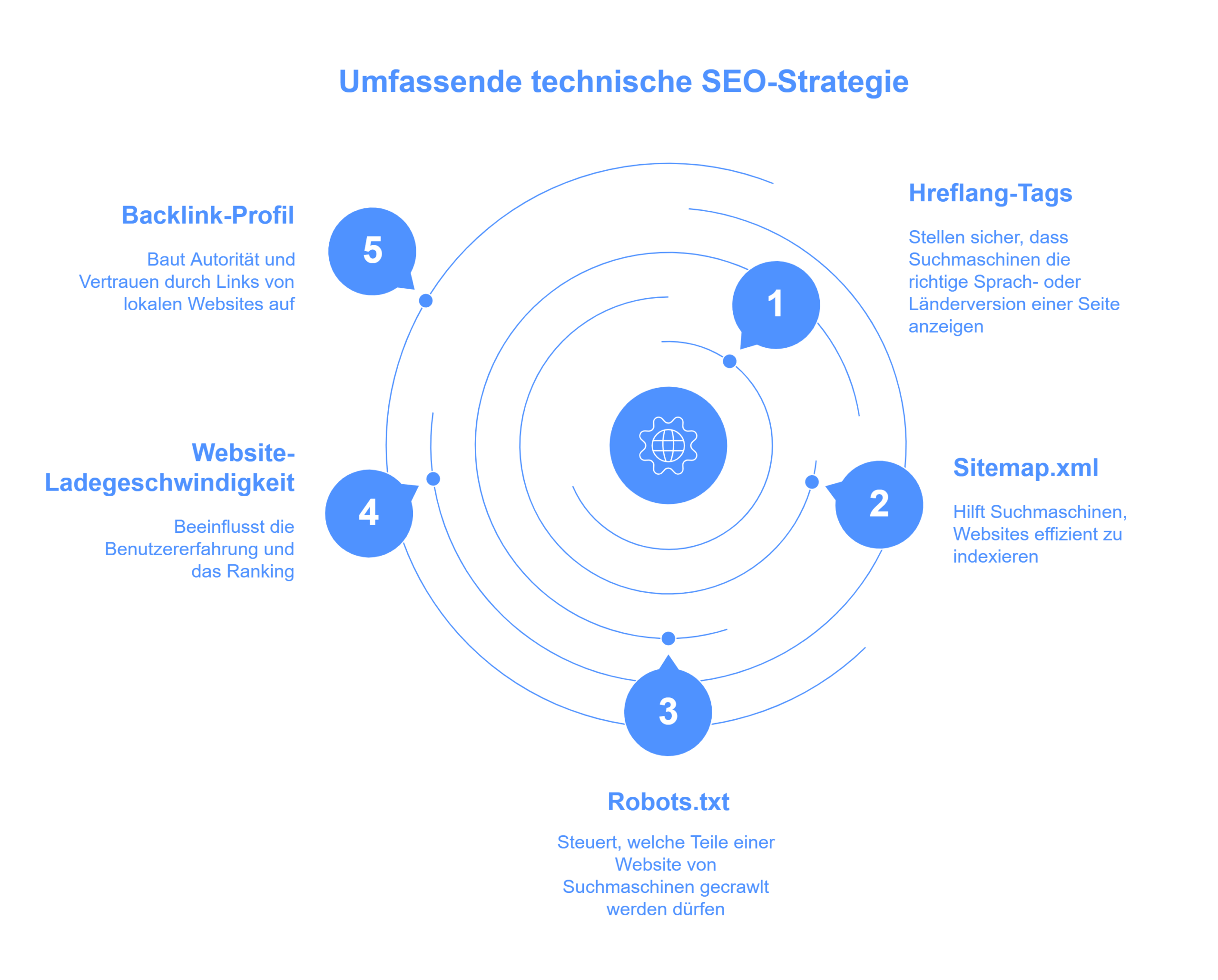Wenn Sie die Reichweite Ihres Unternehmens über die eigenen Landesgrenzen hinaus erweitern möchten, ist internationales SEO ein sinnvoller Schritt. Mit einer international ausgerichteten SEO-Strategie passen Sie Ihre Maßnahmen an die unterschiedlichen Suchgewohnheiten in verschiedenen Ländern an.
Klingt herausfordernd? Nicht, wenn Sie über die richtigen Informationen und Partner an Ihrer Seite verfügen. In diesem Artikel erklären wir, worauf es beim internationalen SEO ankommt und wie Sie es erfolgreich anwenden können.
Was ist Internationales SEO?
Internationales SEO bezeichnet die Suchmaschinenoptimierung von Websites für verschiedene Länder. Ziel dieser Optimierung ist es, die Sichtbarkeit in den Suchergebnissen der jeweiligen Zielmärkte zu verbessern und potenzielle Kunden dort gezielt anzusprechen.
Internationales SEO umfasst sowohl technische als auch inhaltliche Aspekte, die auf die individuellen Bedürfnisse und Suchgewohnheiten der jeweiligen Zielgruppen abgestimmt sind. Wenn Sie Ihre Zielgruppen in anderen Märkten erreichen möchten, sprechen Sie gerne mit unserem Team.
Wann ist eine internationale SEO-Strategie sinnvoll?

Eine internationale SEO-Strategie ist sinnvoll, wenn Ihr Unternehmen eine internationale Zielgruppe anspricht und Sie in weitere Länder expandieren möchten.
Besonders relevant ist sie, wenn Ihr Unternehmen bereits in einem Markt etabliert ist und neue Märkte erschließen will. Auch wenn Sie bereits Standorte in diesen Ländern betreiben, kann eine international ausgerichtete SEO-Strategie von Vorteil sein.
Wichtige Faktoren, die für eine internationale SEO-Strategie sprechen:
- Ihr Produkt oder Ihre Dienstleistung ist in mehreren Ländern relevant.
- Es besteht nachweislich eine hohe Nachfrage in anderen Märkten (z. B. durch Marktanalysen).
- Ihr Unternehmen kann die logistischen und rechtlichen Anforderungen des internationalen Handels erfüllen.
- Die Wettbewerbsanalyse zeigt, dass es Potenzial gibt, sich in neuen Märkten zu etablieren.
Um den Erfolg Ihrer Internationalisierungsstrategie zu sichern, ist eine detaillierte Marktanalyse unerlässlich. Sie hilft dabei, potenzielle Hürden zu erkennen, die richtige Zielgruppe anzusprechen und ein umfassendes Verständnis der Wettbewerbssituation zu gewinnen.
Vorteile und Nachteile von internationalem SEO

Ein großer Vorteil von internationalem SEO ist die Erweiterung Ihrer Zielgruppe, da Sie Zugang zu neuen Märkten und potenziellen Kunden weltweit erhalten. Die Optimierung Ihrer Website für verschiedene Sprachen und Kulturen kann zudem die Markenbekanntheit steigern. Dies kann Ihrem Unternehmen helfen, sich in weniger umkämpften Märkten schneller als führender Anbieter zu positionieren und so einen Wettbewerbsvorteil zu erlangen.
Langfristig ist internationales SEO eine kosteneffiziente Strategie. Es ermöglicht eine nachhaltige, organische Sichtbarkeit, die nicht von kontinuierlichen Investitionen in bezahlte Werbung abhängig ist.
Diese Vorteile gehen jedoch auch mit einigen Herausforderungen einher. Kulturelle Unterschiede müssen berücksichtigt werden, da sich Marketingstrategien nicht einfach von einem Land auf ein anderes übertragen lassen. Ebenso ist es entscheidend, die in den Zielmärkten dominante Suchmaschine zu identifizieren – denn Google ist nicht überall Marktführer.
Sprachbarrieren stellen eine weitere Hürde dar: Ihre Inhalte müssen nicht nur korrekt übersetzt, sondern auch an die kulturellen Besonderheiten des jeweiligen Landes angepasst werden. Darüber hinaus unterscheiden sich die gesetzlichen Vorgaben von Land zu Land erheblich – insbesondere im Hinblick auf Datenschutz, Impressumspflichten und Steuerregelungen – und erfordern eine sorgfältige rechtliche Prüfung.
Herausforderungen des internationalen SEO
Die Internationalisierung Ihrer Website bringt verschiedene Herausforderungen mit sich, die nicht unterschätzt werden sollten. Kulturelle Unterschiede sind ein entscheidender Faktor.
Sie können dazu führen, dass Marketingstrategien, die in einem Land gut funktionieren, in einem anderen völlig wirkungslos sind. Die Anpassung von Inhalten an lokale Gegebenheiten ist daher unerlässlich, um das Vertrauen und Interesse der Zielgruppe zu gewinnen.
Ein weiteres Problem besteht darin, dass Google nicht in jedem Land die dominierende Suchmaschine ist. Während Google in vielen westlichen Ländern Marktführer ist, haben andere Märkte ihre eigenen Suchmaschinen mit unterschiedlichen Algorithmen und Ranking-Faktoren. Eine Anpassung der SEO-Strategie an die jeweilige Suchmaschine ist daher unerlässlich.

Auch Sprachbarrieren spielen eine große Rolle. Eine einfache Übersetzung von Inhalten reicht oft nicht aus, da bestimmte Begriffe, Redewendungen oder sogar Produktnamen in anderen Sprachen anders verwendet werden. Deshalb ist es wichtig, dass Inhalte nicht nur sprachlich korrekt übersetzt, sondern auch an kulturelle Nuancen angepasst werden. Hierbei können Lokalisierung oder sogar Transkreation hilfreich sein.
Schließlich stellen gesetzliche Vorgaben eine bedeutende Hürde dar. Jedes Land hat eigene Anforderungen an Datenschutz, Impressumspflicht und steuerliche Regelungen, die strikt eingehalten werden müssen. Datenschutzrichtlinien wie die DSGVO in Europa oder spezielle Regelungen in den USA oder China können einen erheblichen Einfluss auf Gestaltung und Betrieb einer Website haben.
Die Herausforderungen des internationalen SEO:
- Kulturelle Unterschiede: Marketingstrategien müssen an lokale Gegebenheiten angepasst werden.
- Unterschiedliche Suchmaschinen: Google ist nicht überall Marktführer – in China dominiert Baidu, in Russland Yandex.
- Sprachbarrieren: Übersetzungen müssen nicht nur korrekt, sondern auch kulturell passend sein.
- Rechtliche Anforderungen: Datenschutzgesetze, Impressumspflichten und steuerliche Regelungen variieren von Land zu Land und erfordern eine sorgfältige Prüfung.
Wenn Sie Fragen haben, kontaktieren Sie uns gerne. Wir unterstützen Sie dabei, Ihre internationale SEO-Strategie optimal auszurichten.
Kennen Sie den lokalen SEO-Markt?
Ein oft unterschätzter, aber entscheidender Faktor für erfolgreiches internationales SEO ist das lokale Nutzerverhalten. Jede Region hat eigene Vorlieben, Gewohnheiten und Erwartungen an digitale Inhalte. Während in einigen Ländern ausführliche Blogartikel bevorzugt werden, legen andere Kulturen mehr Wert auf visuelle Inhalte oder interaktive Elemente.
In Japan sind beispielsweise detaillierte Produktbeschreibungen und zahlreiche Kundenbewertungen unerlässlich, während in skandinavischen Ländern ein minimalistisches Design und eine intuitive Navigation entscheidend für die Nutzererfahrung sind.

Ein weiterer zentraler Aspekt ist das Kaufverhalten der Zielgruppe. In den USA sind Kreditkartenzahlungen die Norm, während in Deutschland und den Niederlanden der Kauf auf Rechnung oder Direktüberweisungen (z. B. Giropay oder iDEAL) bevorzugt werden. Diese Unterschiede sollten auch im Checkout-Prozess einer international optimierten Website berücksichtigt werden, um Konversionshürden zu vermeiden.
Auch lokale Feiertage, saisonale Trends und kulturelle Ereignisse spielen eine wichtige Rolle im internationalen SEO. Während der Black Friday in den USA und Europa enorme Umsätze generiert, hat er in vielen asiatischen Ländern nur eine geringe Bedeutung. Dafür sind dort Shopping-Events wie der Singles’ Day in China umso wichtiger. Inhalte und Kampagnen sollten daher gezielt an lokale Gegebenheiten angepasst werden, um maximale Reichweite und Interaktion zu erzielen.
Was Sie über den internationalen SEO-Markt wissen sollten:
- Nutzerverhalten analysieren: Welche Inhalte werden bevorzugt (Text, Video, interaktive Elemente)?
- Kaufgewohnheiten verstehen: Welche Zahlungsmethoden werden in den einzelnen Ländern bevorzugt?
- Feiertage und saisonale Trends nutzen: Wann sind die wichtigsten Einkaufs- und Konsumzeiten?
- Design- und UX-Vorlieben berücksichtigen: Welche Strukturen und Layouts empfindet die Zielgruppe als intuitiv und ansprechend?
Durch tiefgehendes Wissen über den lokalen SEO-Markt und die gezielte Anpassung an die jeweilige Zielgruppe lässt sich eine internationale SEO-Strategie wirkungsvoll einsetzen.
Mobile SEO und User Experience (UX) für verschiedene Länder
Ein entscheidender Faktor für internationales SEO ist die mobile Optimierung, da die Smartphone-Nutzung je nach Region stark variiert. In einigen Ländern, wie etwa Indien oder Südostasien, greifen die meisten Nutzer fast ausschließlich über mobile Endgeräte auf das Internet zu.
Daher ist es wichtig, die mobile Nutzererfahrung (UX) an die Gewohnheiten der jeweiligen Zielgruppe anzupassen.

Schnelle Ladezeiten, eine intuitive Navigation und mobilfreundliche Inhalte sind essenziell, um Absprungraten zu minimieren. Es lohnt sich außerdem zu prüfen, welche mobilen Suchmaschinen in den einzelnen Ländern dominieren – denn nicht nur Google, sondern auch Anbieter wie Baidu oder Yandex haben eigene Ranking-Kriterien für mobile Suchergebnisse.
Tipps für eine erfolgreiche mobile Optimierung im internationalen SEO:
- Mobile-First-Indexierung beachten: Google bewertet und indexiert mittlerweile primär die mobile Version einer Website. Stellen Sie sicher, dass alle wichtigen Inhalte, Metadaten und strukturierten Daten auch mobil vollständig vorhanden und zugänglich sind.
- Ladezeiten optimieren: In vielen Ländern ist die Internetgeschwindigkeit langsamer als in Europa oder Nordamerika. Nutzen Sie AMP (Accelerated Mobile Pages), reduzieren Sie die Dateigröße von Bildern und Videos und setzen Sie auf ein Content Delivery Network (CDN), um Ladezeiten zu minimieren.
- Responsives Design verwenden: Die Website sollte sich automatisch an verschiedene Bildschirmgrößen anpassen und auf Smartphones, Tablets und Desktops eine gleichbleibend gute Nutzererfahrung bieten.
- Einfache Navigation ermöglichen: Vermeiden Sie komplexe Menüs und setzen Sie auf eine einfache, intuitive Benutzerführung. Mobile Nutzer sollten mit wenigen Klicks ihr Ziel erreichen.
- Touchscreen-freundliche Elemente nutzen: Buttons und Links sollten groß genug sein, um bequem mit dem Finger bedient werden zu können, ohne versehentlich andere Elemente zu aktivieren.
Technische Aspekte der internationalen SEO

Ein wesentlicher Bestandteil des internationalen SEO sind die technischen Aspekte. Sie stellen sicher, dass Suchmaschinen und Nutzer die korrekte Sprach- oder Länderversion Ihrer Website problemlos finden und nutzen können. Neben der inhaltlichen Anpassung an lokale Märkte spielen technische Faktoren eine entscheidende Rolle für Performance, Benutzerfreundlichkeit und Indexierung Ihrer Seiten.
Ein besonders wichtiger Punkt ist die korrekte Implementierung des hreflang-Tags. Dieser signalisiert Google, welche Sprach- und Länderversion einer Seite für welche Nutzergruppe relevant ist. So werden Probleme mit Duplicate Content vermieden und sichergestellt, dass in den jeweiligen Suchergebnissen die richtige Version angezeigt wird.
Außerdem profitieren die verschiedenen Sprach- und Länderversionen einer Website von einem starken, gemeinsamen Linkprofil, was sich positiv auf das Ranking auswirken kann.
Auch die sitemap.xml sollte für jede Sprach- und Länderversion separat erstellt werden. Das erleichtert die Indexierung durch Suchmaschinen und ermöglicht eine schnellere Erkennung potenzieller Fehler.
Besonders bei umfangreichen Websites mit vielen länderspezifischen Inhalten ist eine saubere Struktur und eine klare Zuordnung der Inhalte zu den jeweiligen Märkten für Google von großer Bedeutung.
Ein weiteres technisches SEO-Element ist die robots.txt-Datei. Sie steuert, welche Bereiche der Website von Suchmaschinen gecrawlt werden dürfen. Je nach gewählter Domain-Strategie muss entweder eine zentrale oder mehrere separate robots.txt-Dateien eingerichtet werden. Während bei einer globalen Domain eine zentrale Datei genügt, benötigen einzelne Länderdomains jeweils eine eigene robots.txt, um den Crawl-Prozess optimal zu steuern.
Ein häufig unterschätzter SEO-Faktor ist die Ladegeschwindigkeit der Website, die unter anderem durch den Serverstandort beeinflusst wird.
Auch das Thema lange Ladezeiten spielt im internationalen SEO eine Rolle. Sie beeinträchtigen die Nutzererfahrung und können sich negativ auf das Ranking auswirken. Eine effiziente Lösung bietet der Einsatz eines Content Delivery Networks (CDN). Dabei werden Inhalte auf Servern weltweit gespeichert und vom geografisch nächstgelegenen Standort zum Nutzer ausgeliefert.
Neben diesen technischen SEO-Anpassungen spielt auch das Backlink-Profil eine zentrale Rolle. Länderspezifische Backlinks sind besonders wertvoll, da Suchmaschinen Verlinkungen aus dem jeweiligen Zielmarkt als Vertrauenssignal werten. Für ein starkes internationales Linkprofil sollten Kooperationen mit lokalen Websites, Branchenverzeichnissen und Influencern im jeweiligen Land aufgebaut werden.
Zudem ist darauf zu achten, dass die Backlinks stets auf die passende Sprach- oder Länderversion der Website verweisen, um maximale Relevanz für Suchmaschinen zu erzielen. Wenn Sie Fragen zu SEO oder internationalem Marketing haben, kontaktieren Sie gerne unsere Agentur. Wir helfen Ihnen, Ihre SEO-Strategie gezielt auf globale und internationale Märkte auszurichten.


